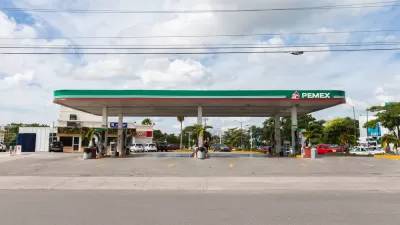Mexico is poised to allow foreign investment in its state-owned oil company, Pemex, for the first time in 75 years. In Venezuela, home to the world's cheapest gasoline, prices are due to skyrocket if President Maduro ends subsidies as he's indicated.
Mexico and Venezuela are the West's two major oil producers whose oil companies are state-owned, or "owned by the people", as their supporters describe it. Both are experiencing declining production. Change, though of different types, appears to be coming to both nations that may increase oil production and boost federal revenues.
As we posted here in August, Mexico, 'the world's ninth largest oil producer and first to nationalize its oil production, has seen steep production declines as the state-owned oil company lacks (the necessary) capital resources and expertise" to invest in oil production. With "legislation passed by Congress on 13 December and ratified by a majority of Mexican states" and signed by President Enrique Pena Nieto on Dec. 20, the tide may be reversed, as the BBC News indicates.
"This is the beginning of a new history for our country. We have opened the doors for a better future for all," said Mr Pena Nieto.
The historic legislation amends the constitution to "allow foreign investment in oil, gas and electricity," i.e. the energy market has been opened. Christian A. DeHaemer, in his piece in Energy & Capital, "Mexico Oil: Full Gusher" predicts that "(f)racking, the same technology that is quickly turning the United States into the world's biggest producer of oil and natural gas, will soon transform Mexico as well."
However, one last potential hurdle to the influx of foreign capital may be a referendum submitted by the Party of the Democratic Revolution, or PRD, that opposes the change which they characterize as privatization, writes Juan Montez of the Wall Street Journal.
And in Venezuela, the world's thirteenth largest oil producer, President Nicolas Maduro indicates he will reduce, if not eliminate, the government's substantial subsidy of oil prices that keeps gasoline prices at a nickel a gallon, though it's obtained on the black market for a penny a gallon, write the staff of The Truth About Cars (TTAC). We posted here in March that under Maduro's predecessor, Hugo Chávez, "[e]nergy experts say his gasoline subsidies doubled domestic consumption, cutting deeply into exports in addition to "draining the budget of $1.5 billion annually."
While the article's title suggests gas prices could rise to $1.60 gallon, they write that "it’s unknown how much Maduro will raise the price." In an AP article, "Venezuela car owners unfazed by planned fuel hike", the reporters suggest that as long as the amount of the increase isn't publicized, the people are not worrying.
Gas prices in Venezuela have been unchanged for 20 years, as has been the federal gas tax in the U.S. While subsidizing gas prices is different than subsidizing transportation expenditures because of insufficient gas tax revenue ($41 billion since 2008, and $14 billion in 2015, as noted here), there are analogies to consider. For example, both subsidies drain federal budgets and keep gas prices artificially low, which increases driving.
FULL STORY: Mexican president signs controversial oil and gas law

Planetizen Federal Action Tracker
A weekly monitor of how Trump’s orders and actions are impacting planners and planning in America.

Chicago’s Ghost Rails
Just beneath the surface of the modern city lie the remnants of its expansive early 20th-century streetcar system.

San Antonio and Austin are Fusing Into one Massive Megaregion
The region spanning the two central Texas cities is growing fast, posing challenges for local infrastructure and water supplies.

Since Zion's Shuttles Went Electric “The Smog is Gone”
Visitors to Zion National Park can enjoy the canyon via the nation’s first fully electric park shuttle system.

Trump Distributing DOT Safety Funds at 1/10 Rate of Biden
Funds for Safe Streets and other transportation safety and equity programs are being held up by administrative reviews and conflicts with the Trump administration’s priorities.

German Cities Subsidize Taxis for Women Amid Wave of Violence
Free or low-cost taxi rides can help women navigate cities more safely, but critics say the programs don't address the root causes of violence against women.
Urban Design for Planners 1: Software Tools
This six-course series explores essential urban design concepts using open source software and equips planners with the tools they need to participate fully in the urban design process.
Planning for Universal Design
Learn the tools for implementing Universal Design in planning regulations.
planning NEXT
Appalachian Highlands Housing Partners
Mpact (founded as Rail~Volution)
City of Camden Redevelopment Agency
City of Astoria
City of Portland
City of Laramie



























